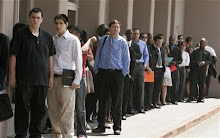
McMURRAY, Pa. - There I was this morning, sitting with three elderly men in a bland corner room at the Peters Township Municipal Library, with a pencil in hand and 28 multi-choice questions at my disposal. The four of us arrived early to offer the proper identification and fill out the paperwork before taking the test. It was a bizarre scene that made me feel like I was in high school all over again -- albeit in an alternate universe.
Instead of the SATs or final exams, I was taking a test to gauge whether I had what it takes to knock on doors for the U.S. Census Bureau and count human beings like they were cattle. It might not be a glamorous job, but it offers a part-time schedule with supposedly decent pay. And, it's a good financial opportunity if the job market is still ice cold five months from now.
But back to the test. One man coughed and wheezed for a moment while filling out his paperwork. The elderly gentleman behind me forgot his ID, and needed to scrounge around his car to find a Social Security card and/or birth certificate (which I assume was printed in the 19th Century). A Census worker read instructions before the test, but the man next to me looked puzzled. He told the worker that he couldn't hear well enough, and asked for the instructions to be read again.
Splendid.
I rolled through the 28 questions, stopping on some for a few extra moments. I'm not really sure the point of the 30-minute exam, except maybe to sift through people born without brains.
I guess I have some semblance of a medulla oblongata (thank you Bobby Boucher) because I aced the test. So now I wait to learn if the Census Bureau will need my services next year. Maybe I'll even see my three geriatric test-taking pals on the beat.
Instead of the SATs or final exams, I was taking a test to gauge whether I had what it takes to knock on doors for the U.S. Census Bureau and count human beings like they were cattle. It might not be a glamorous job, but it offers a part-time schedule with supposedly decent pay. And, it's a good financial opportunity if the job market is still ice cold five months from now.
But back to the test. One man coughed and wheezed for a moment while filling out his paperwork. The elderly gentleman behind me forgot his ID, and needed to scrounge around his car to find a Social Security card and/or birth certificate (which I assume was printed in the 19th Century). A Census worker read instructions before the test, but the man next to me looked puzzled. He told the worker that he couldn't hear well enough, and asked for the instructions to be read again.
Splendid.
I rolled through the 28 questions, stopping on some for a few extra moments. I'm not really sure the point of the 30-minute exam, except maybe to sift through people born without brains.
I guess I have some semblance of a medulla oblongata (thank you Bobby Boucher) because I aced the test. So now I wait to learn if the Census Bureau will need my services next year. Maybe I'll even see my three geriatric test-taking pals on the beat.












